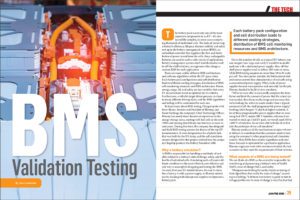Charged Electric Vehicles Magazine
Issue 47 – January/February 2020
Featuring

ROCSYS automates charging stations with soft robots
ROCSYS founder Crijn Bouman is no stranger to innovation. A self-described “entrepreneur at heart,” Bouman has led two Netherlands-based startups in cleantech, software, and electronics. When his first EV fast charging equipment company Epyon was acquired by ABB almost a decade ago, he stayed on as Head of Product Management for its charging portfolio for… Read more »
Here’s why Tesla transitioned to a semi-custom power module design in Model 3 inverter
A closer look at semiconductor packaging considerations in EVs One of the most critical decisions to be made at the earliest stage of designing a new power converter concerns the packages used for the semiconductors, as pretty much every other aspect of the design hinges on their physical form. This is especially true for the main… Read more »
Enevate says its silicon-dominant anode technology is ready for EV production
Q&A with Enevate’s Founder and CTO Dr. Benjamin Park Introducing silicon into automotive-grade lithium-ion cells has been a major topic in the EV industry in the past decade. Silicon is widely considered to be the next big thing in anode technology, because it has a theoretical charge capacity ten times higher than that of typical graphite anodes…. Read more »

2021 Ford Mustang Mach-E: An electric crossover with “the soul of a Mustang”
It’s almost enough to make you think Ford plans to offer electric cars shoppers may actually want to buy. The extended debut of the 2021 Ford Mustang Mach-E electric SUV culminated in its formal unveiling in an aircraft hangar last November, just before the start of media days at the Los Angeles Auto Show. The… Read more »

Q&A with Electrify America’s Chief Operating Officer
It would be understandable to be a bit skeptical about Electrify America—after all, it was founded by decree of a court, as atonement for VW’s diesel-related dirty deeds. However, by all accounts the company is taking its mission to increase EV adoption by building a first-class charging network quite seriously, and is setting a fine… Read more »

A look at BMS validation testing
The battery pack is not only one of the most expensive components in an EV—it’s also incredibly complex, in some cases comprising thousands of individual cells. The tasks of preserving a battery’s efficiency, lifespan, thermal stability and safety rest upon the battery management system (BMS), an embedded controller that regulates the flow and distribution of… Read more »






